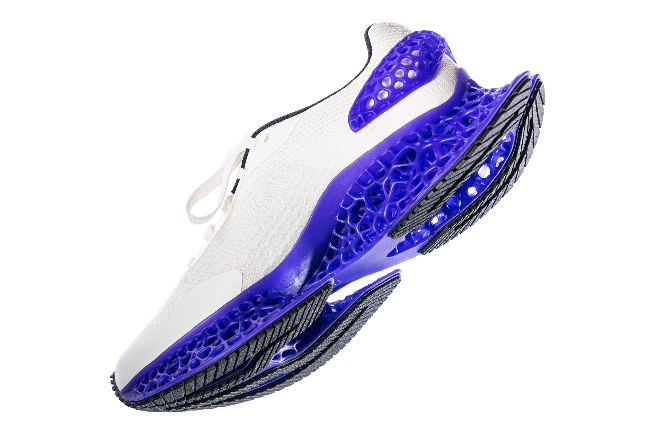US 3D printer OEM Carbon has introduced EPU 46 — its newest elastomer material. EPU 46 offers high-performance material properties, superior durability, and rich color options, facilitating customizable production of products like saddles, footwear, and grips.
Designed to meet diverse industry demands, EPU 46 improves performance, comfort, and aesthetics. Customers can fine-tune material stiffness without compromising printability or altering properties. EPU 46 aligns with Carbon’s sustainability efforts, featuring 40% bio-based materials and minimizing waste through solvent-free spin cleaning and resin reclaim methods. Expanding Carbon’s idea-to-production platform, it helps create novel, colorful products with variable stiffness, says Carbon.
“EPU 46 is the future of elastomer customization, combining the benefits of performance, comfort, and durability with the excitement of custom colors and tunable material stiffness,” said Jason Rolland, SVP of Materials at Carbon. “EPU 46 furthers our commitment to providing a robust and complete idea-to-production platform that can be fully customized to our client’s specifications. This is truly the next step in our journey to creating anything that can be dreamt up.”
Exploring the capabilities of EPU 46
The EPU 46 platform provides both speed and customization options for 3D printing. It enables the production of objects in a range of colors and material stiffness levels without compromising print quality or printing speed.
In addition, color fastness is assured through the direct integration of pigments into the resin, preventing any degradation or color changes over time. EPU 46 is available in both black and a color base, allowing for direct coloration. This feature enables users to craft a wide range of opaque and translucent colors while maintaining the material’s mechanical properties and printability.
Users can adjust material stiffness by varying resin ratios, allowing for a range from Shore 78A to Shore 56A, all while maintaining printability. Carbon has verified formulations for both soft and extra-soft materials, and it provides printer drop-down options for further optimization. Additionally, EPU 46 meets biocompatibility requirements in accordance with ISO standards 10993-5, 10993-10, and 10993-23, making it suitable for applications where biocompatibility is essential, like medical devices and implants.

Advancements in elastomer materials
Last year, Carbon introduced a bioresorbable material with proven in vivo biocompatibility. During testing, this experimental in-house elastomer received a ‘non-toxic’ classification and demonstrated customizability for complete tissue absorption. According to the company, this resin is suitable for 3D printing lattice structures, expanding applications in tissue repair, nerve conduit creation, and wound dressing.
Netherlands-based photopolymer manufacturer Liqcreate expanded its 3D printing material portfolio by introducing an elastic engineering resin. Named Elastomer-X, this resin is designed to be the softest elastomers on the market, offering high elongation, tear strength, and a low Shore A hardness of just 43, similar to TPUs and silicones in terms of pliability. Liqcreate specified that this polymer is suitable for various 3D printing applications, including grommets, digital lattice foams, elastic industrial components, bellows, and soft end-of-arm tooling (EOAT) for robots.
Who will win the 2023 3D Printing Industry Awards? Make your nominations now!
What does the future of 3D printing for the next ten years hold?
What engineering challenges will need to be tackled in the additive manufacturing sector in the coming decade?
To stay up to date with the latest 3D printing news, don’t forget to subscribe to the 3D Printing Industry newsletter or follow us on Twitter, or like our page on Facebook.
While you’re here, why not subscribe to our Youtube channel? Featuring discussion, debriefs, video shorts, and webinar replays.
Are you looking for a job in the additive manufacturing industry? Visit 3D Printing Jobs for a selection of roles in the industry.
Featured image shows 3D printed midsole created using Carbon EPU 46 material. Photo via Carbon.



